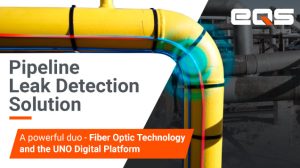
Digitalization and Risk Management of Critical Engineering Assets
On July 3, 4 and 5, Parque das Nações hosted Congr’EGA 2024. An event that seeks to push the boundaries of Sustainable and Digital Innovation, bringing together companies and professionals looking to share experiences and debate research knowledge and case studies of advanced asset management solutions using digitalization.
EQS, a Kiwa Group company, took part in this event as a Silver Sponsor and had the opportunity to organize a Satellite Session, the main theme of which was “Digitalization and Risk Management of Critical Engineering Assets”. Under this theme, it was possible to present cases of how the integration of sustainable methodologies and innovative technologies makes it possible to mitigate operational risks, guaranteeing the longevity and efficiency of assets, improving operational safety, digitizing operations and complying with global standards and sustainable goals.
- During this session, there was a round table with the following guests:
- Luís Nicolau, Director of Asset Management and Engineering at Águas do Norte;
- Duarte Dias, Research Center Assistant Coordinator at INESC TEC;
- Filipe Nunes, Engineer Geotechnical and Geoenvironment at Amorim Cork Insulation;
- Hugo Branquinho, VP Digital Solutions at EQS Global.
These experts shared real-life case studies demonstrating the application of advanced technologies such as sensing, 3D visualization and remote observation in demanding industrial environments. The aim of this session was to discuss how the digital approach based on the ISO 55000 standard can revolutionize monitoring, evaluation and the improvement of decision-making processes in asset-intensive industries, while promoting sustainability.
During the session, all the guests were able to present their individual cases, demonstrating concrete examples of how digitalization in Asset Management has brought benefits to their companies and discussing its impact. Below are the topics that were explored.
“Asset Management at Águas do Norte. The Opportunities of Digitalization.”
– Luís Nicolau, Águas do Norte
Luís Nicolau, Director of Asset Management and Engineering at Águas do Norte, highlighted the importance of digitalization in asset management in the water sector. He stressed that infrastructure is crucial and is associated with high investment costs, making the efficient management of infrastructure assets a major challenge. He also emphasized that the sustainability of the service must balance risk, cost and performance, in accordance with the ISO 50001 standard.
Luís Nicolau addressed Águas do Norte’s specific difficulties and presented the company’s strategy, based on three essential pillars.
- the implementation and certification of the Asset Management System (SGAt), to objectively define procedures and rules;
- concern for the asset register, which led to the creation of the Asset Inventory and Register Tool (FICA), complemented by the SIGAME tool, which aims to take advantage of all visits to facilities to make suggestions for correcting the register;
- the adoption of Decision Support Tools, with emphasis on the development of OTIMA for vertical infrastructures and the Linear Infrastructure Condition Assessment Tool (FACIL). He also highlighted the Dams in the Palm of Your Hand tool and the implementation of Esri’s Utility Network with a service-based architecture, which allows complex networks to be analyzed.
Águas do Norte manages its assets using EQS Digital’s UNO platform, which facilitates inventory, inspection, classification and virtual visualization of all facilities. This solution has been particularly effective in meeting the mobility challenge identified by Águas do Norte, as well as contributing to more sustainable practices by optimizing the use of resources.
“Empowering Human Operator as an Asset in Industry 5.0”
– Duarte Dias, INESC TEC
Duarte Dias, Biomedical Engineer and Assistant Research Coordinator at INESC TEC, presented an innovative vision on digitalization and asset management, highlighting the role of the human operator in Industry 5.0. During the presentation, he highlighted INESC TEC’s approach to transforming the human operator into an asset, using technologies to improve efficiency, safety and the well-being of workers, which include:
- Physiology: monitoring vital signs such as ECG, respiration, temperature and SpO2;
- Movement and Location: monitoring physical activity and the worker’s position;
- Environment: assessment of environmental conditions such as temperature, humidity and exposure to toxic gases.
Duarte Dias also presented the WeSENSS solution, an INESC TEC spin-off, which aims to bring monitoring solutions to workers at risk. This project includes a monitoring component called quantified occupational health and brings several benefits, including:
- Identification and prevention of health problems;
- Support for the well-being and safety of professionals;
- More effective intervention in the event of accidents;
- Analysis of worker efficiency.
The WeSENSS system is integrated with EQS’s MAN DOWN system. These share variables with each other and are used by clients to quantify people’s well-being and allocate them to each task at the right time. These practices not only increase worker safety, but also contribute to sustainability by promoting a safer and healthier working environment.
“Digitalization and risk management in the cork industry.”
– Filipe Nunes, Amorim Cork Insulation
Filipe Nunes, geotechnical and geoenvironmental engineer at Amorim Cork Insulation, addressed digitalization and asset management in the cork industry, emphasizing the importance of preserving and optimizing the value of assets throughout their life cycle.
In collaboration with EQS, Corticeira Amorim implemented the ATEX GLOBAL program at its Silves plant. This project integrates all industrial equipment into a digital platform, standardizing processes and procedures. The platform enables real-time monitoring of tasks, identification of assets, inspections, non-conformities and action plans.
ATEX GLOBAL allows access to all asset information by QR CODE, guaranteeing compliance with legislation with six macro tasks:
- Creation and revision of the ATEX manual;
- Field inspection;
- Identification of gaps (GAP) and recommendations for action;
- Preparation of action plans;
- Reinspection;
- Periodic inspections.
Finally, Filipe Nunes underlined the transformative role of digitalization in asset management, highlighting the importance of innovation to increase efficiency, compliance and added value in cork production. He also highlighted how these practices contribute to sustainability by optimizing the use of natural resources and reducing waste.
“Engineering and Technology”
– Hugo Branquinho, EQS Global
Hugo Branquinho, VP Digital Solutions, highlighted EQS Digital’s innovative solutions, positioning the company as a full-service provider with integrated hardware, software and operations.
EQS Digital has created the UNO Platform, which collects asset data with advanced hardware, integrating systems and developing new sensors for precise monitoring. This platform transforms raw data into actionable information and stands out for its approach to digitization, asset management, digital operations and risk management. UNO enables asset portfolio management, 3D visualization, document scanning, monitoring, remote access and the simultaneous use of multiple devices.
Hugo Branquinho also presented some of EQS Digital’s innovative projects, which put them at the forefront of advanced data monitoring and analysis platforms, such as:
- Smart Pad for monitoring the cushioning of insoles on railway lines;
- Monitoring and optimization of hydrogen production, storage and distribution using digital tools;
- Creation of the Digital Twin using 5G technology for digital inspections and remote assistance.
Finally, Hugo Branquinho highlighted EQS Digital’s focus on empowering industries so that they can face future challenges with advanced technologies and a data-centric approach.
The practices presented not only improve asset efficiency and safety, but also promote sustainability by optimizing resources, reducing waste and minimizing environmental impacts. The integration of green hydrogen technologies, in particular, represents a significant step towards decarbonization and the promotion of renewable energies.
In short, digitalization and risk management can support the transition to a greener and more sustainable economy. It reinforces the importance of environmental preservation and resource efficiency, but also shows how digitalization can be a powerful tool for achieving environmental goals.
EQS is now part of the Kiwa Group, with global operations in Inspection, Certification and Testing in several international markets. The Kiwa Group employs more than 10,000 people in over 35 countries in Europe, Asia-Pacific, North America and Latin America.





